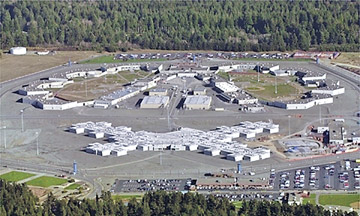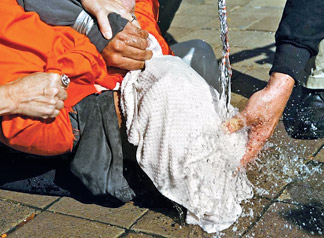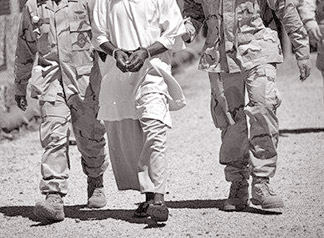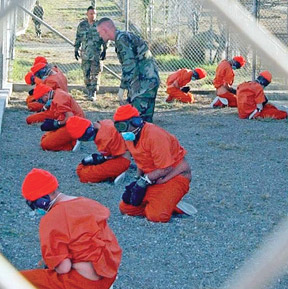|
Opinion:
US wants speedy justice for ex-Tigers, but not for Guantanamo
detainees
by Daya GAMAGE
 |
|
Guantanamo Bay prison |
The Asian Tribune US Bureau noted with amusement that the United
States reiterated that it looks forward to a ‘speedy and transparent
judicial process’ regarding ex-LTTE combatants and all other detainees
held in various prisons in Sri Lanka.
The US Embassy in Colombo made this remark on May 29, according to a
Sri Lankan national newspaper, in the wake of a campaign by some
political activists to secure the release of LTTE suspects and the
Government planning to set up three separate courts in Anuradhapura,
Vavuniya and Mannar to try them.
When the newspaper concerned asked about the matter, a spokesman for
the US Embassy had said that the US was only interested in the upholding
of the rule of law and quick judicial process with regard to LTTE
suspects, as recommended by the Lessons Learnt and Reconciliation
Commission (LLRC).
The Sri Lanka media further reported that the Government has indicted
359 ex-combatants and are carrying out investigations regarding 309
others. Also, some other suspects arrested under the provisions of the
Prevention of Terrorism Act have been referred to various rehabilitation
centres.
Cabinet spokesman Minister Keheliya Rambukwella, reacting to the
United States request for a “speedy and transparent judicial process”
regarding ex-LTTE cadres said the Government had an action plan
regarding these cadres and was working in accordance with it.
“You have to remember that these are hardcore terrorists we are
talking about, who were taken into custody or who surrendered to the
Government. Therefore, legal proceedings are taking place against these
people. If some quarters are urging to speed up the process, what it
implies is that it’s asking the judicial process to be silent. This is
not within our system - our Constitution clearly provides for a coherent
legal system and this is what we are adhering to,” he said addressing
the media in Colombo.
Cabinet Minister Nimal Siripala de Silva told Parliament recently
that there were no political prisoners in Sri Lanka as made out by some
internal and external activists saying 359 former LTTE suspects are
being detained in the country’s prisons, of which 309 have cases pending
against them and added that three new High Courts would be established
to prosecute the cases.
 |
| Water boarding |
 |
| A detainee in
Afghanistan |
What was amusing to this writer who covers the political scene in the
US and its connection to the Asian region and vice versa, is that due
process of law has been denied to ‘enemy combatants’ taken into US
custody, some incarcerated for as long as 10 years, preventing them from
obtaining legal advice, denying them the right to Habeas Corpus long
accepted since the promulgation of the Magna Carta in 1215, and often
subjected to brutal interrogation using ‘water boarding’ - a simulated
drowning technique categorised as a method of torture even by UN human
rights covenants.
Minister Rambukwella went onto point out that the request by certain
quarters completely ignored the procedures laid down. “There are
thousands of cases regarding ex-LTTE cadres and the Attorney General’s
Department has to follow these cases individually. I wonder whether what
they are asking is to bypass these procedures that have been laid down.
This request itself fundamentally and completely ignores the procedures
and the legality of these procedures”, he said.
The Asian Tribune, in this political note, will present the status of
‘long-term’ Guantanamo ‘enemy combatants’ and the cry from many
quarters, both legislative and civil society activists, to execute the
‘due process of law’ to either bring them to justice or release those
who have no culpability in international terrorism.
This political note however does not endeavour to deny a sovereign
State, be it the United States or Sri Lanka, the right to hold ‘enemy
combatants’ in incarceration until investigations, interrogations,
reports and other data are completed to execute the ‘due process of law’
to either bring them to justice or release them.
These nations have the right to protect themselves, eliminate
potential terrorist threats, safeguard their sovereignty and territorial
integrity.
Nevertheless, there is a stark difference between an eight to 10
years of incarceration without access to legal teams, alleged torture
such as water boarding, inhuman interrogation techniques that have been
exposed, denying Habeas Corpus while subverting the rule of law and
holding hardcore enemy combatants, apprehended or surrendered, for less
than three years for the purpose of completing investigations which help
a nation to either prevent potential threats and/or draw a comprehensive
strategy to eliminate a climate/atmosphere for the recurrence of such
non-international terrorism threatening the nation’s sovereignty and
territorial integrity.
|

Detainees at Guantanamo |
Here, we are talking about the eight to 10 year incarceration of
‘enemy combatants’ by the United States with scant regard for the rule
of law and due process of the law.
Military commissions
In 2001, President Bush issued an executive order authorising the
detention of non-citizen “enemy combatants.” In January 2002, the first
prisoners arrived at Guantanamo. Since then, the administration has
engaged in a systematic effort to deprive these detainees of even the
most basic legal rights, and strand them in permanent legal no-man’s
land. A series of Supreme Court cases, Rasul v. Bush, Hamdi v. Rumsfeld
and Hamdan v. Rumsfeld, undermined Bush’s strategy.
In late 2006, legal proceedings at Guantanamo came to a standstill,
because Congress passed the Military Commissions Act of 2006, under
intense pressure from the White House, following the Hamdan decision.
The Act essentially undermines the Habeas Corpus rights of the
detainees, allows the use of evidence obtained through torture, and does
not come close to satisfying fundamental due process requirements.
Wikileaks Guantánamo Bay files
In April 2011, Wikileaks released thousands of pages of classified
documents regarding the status of the almost 800 detainees, ranging from
ages 14 to 89, that have passed through or remain at the Guantanamo Bay
detention centre.
The US military dossiers, obtained by the New York Times and (London)
Guardian, reveal how many prisoners were flown to Guantánamo and held
captive for years on the flimsiest grounds or on the basis of lurid
confessions extracted by maltreatment.
Perhaps the most damning of these documents are the corroborative
evidence of the use of torture, the fact that more than 150 of the
detainees were innocent, and details on the seven men that have died
while in US custody. The files also contain detailed explanations of the
reasons used to justify the prisoners’ detention. In several cases, the
detainees were being held, not because they were dangerous, but because
they were believed to have useful information.
Vincent Warren, the Executive Director of the Centre for
Constitutional Rights, which represented clients in two Guantánamo
Supreme Court cases and coordinates the work of hundreds of pro bono
attorneys representing men detained at the prison camp in an op-ed piece
written January 9 this year said:
“From its inception, Guantánamo was intended to be a legal black
hole, designed to deny its prisoners the most basic human rights and due
process. Most of the 779 men who have been imprisoned and abused there
over the last 10 years were in the wrong place at the wrong time.
They were picked up far from any battlefield, turned over to the US
for a bounty, and held long after government officials acknowledged that
they were innocent of any wrongdoing. Likewise, the military commission
system created to try Guantánamo detainees was invented to allow
convictions based on evidence that would never be allowed in a
courtroom, including hearsay and evidence obtained through torture.”
Through years of tireless work in the courts, the Centre for
Constitutional Rights and pro bono attorneys across the US established
that Guantánamo prisoners have a right to counsel, a right to Habeas
Corpus and a right to meaningfully challenge their detention.
Though several Supreme Court rulings have confirmed that Guantánamo
does not exist outside the law, Congress has blocked attempts to close
the island internment camp at every turn. Provisions in the 2012
National Defence Authorization Act effectively prevent the release of 89
men who have been unanimously cleared by the CIA, FBI, NSC and
Department of Defense for transfer or resettlement, and codify a system
of indefinite detention.
Today, while 171 men remain imprisoned in Guantánamo without charge
or trial, fear-mongering and political gamesmanship have turned
Guantánamo into Obama’s forever prison. And, to date, more men have died
in Guantánamo than have been tried for the suspicions that landed them
there.
In a letter this January to US President Obama Kenneth Roth,
Executive Director, Human Rights Watch said:
“Your National Security Strategy explicitly recognises that the
United States’ “moral leadership is grounded principally in the power of
[its] example.” Your National Strategy for Counter terrorism recognises
the importance of adhering to US core values while fighting terrorism,
including through the respect for human rights.
“As the strategy eloquently outlined, “Where terrorists offer
injustice, disorder, and destruction, the United States must stand for
freedom, fairness, equality, dignity, hope, and opportunity. The power
and appeal of our values enables the United States to build a broad
coalition to act collectively against the common threat posed by
terrorists, further de-legitimising, isolating, and weakening our
adversaries.”
In his speech at Harvard Law School in September 2011,
counter-terrorism advisor John Brennan affirmed that the guiding
principle of all US action is to “uphold the core values that define us
as Americans, and that includes adhering to the rule of law.”
Human Rights Watch further reminds: “The example set by keeping
Guantanamo open undermines the US government’s long-standing opposition
to similar detention regimes in other countries. Over the years, the US
has opposed detention practices that are inconsistent with basic
principles of due process, openly criticising detentions without trial
by Saudi Arabia, Pakistan, Malaysia and China. But such criticisms hold
little weight when the US adopts its own indefinite detention regime.”
The Guantanamo Detainee Review Task Force recommended 48 detainees
for continued detention without charge (now 46 due to the deaths of two
of those detainees). On March 7, 2011, the US President issued an
Executive Order for the Periodic Review of Individuals Detained at
Guantanamo Bay Naval Station Pursuant to the Authorization for the Use
of Military Force.
The US President’s decision to sign into law the National Defence
Authorization Act (NDAA) and thereby potentially expand indefinite
detention without trial, and his acceptance of indefinite detention
without trial for certain detainees already at Guantanamo, as well as
detainees in Afghanistan is being heavily criticised by rights
organisations.
Says Human Rights Watch to the Obama administration: “We urge you to
improve the process under which the detainees in Guantanamo or
Afghanistan can challenge their detention. The Executive Order did
provide for some additional process protections for persons currently
detained at Guantanamo, but instead of providing for the assistance of
counsel at periodic review boards, it provides only for a
government-appointed military representative. This is a blatant denial
by your administration of basic due process rights—a denial that is
already occurring in Afghanistan. As in the so-called administrative
review of detention in Afghanistan, detainees subject to the new review
process at Guantanamo are to be denied access to classified evidence,
even if it is used to justify their continued detention”.
Administrative detention in armed conflict
Ashley S. Deeks, International Affairs Fellow, Council on Foreign
Relations and Visiting Fellow, Centre for Strategic and International
Studies (on leave from the Office of the Legal Adviser, US Department of
State) gives an explanation about this issue especially
non-international conflicts that nations such as Sri Lanka faced.
Before making statements on ‘enemy combatants’ in Sri Lanka’s
custody, the United States should have given some thoughts to the
sentiments expressed by Deeks, a legal authority on conflicts that we
are discussing here and the detention of those who are connected with
such conflicts.
He says; “When a State is engaged in an armed conflict, one of the
most important activities that the State may undertake is detention. The
most familiar type of detention during armed conflict is the detention
by one State of its opponent’s armed forces: when possible, a State’s
armed forces will detain their opponents on the battlefield so as to
prevent those fighters from continuing to take up arms. When this kind
of detention occurs during armed conflicts between States, the 1949
Geneva Convention (III) Relative to the Treatment of Prisoners of War
(Third Geneva Convention) generally provides the rules for such
detentions.(Fourth Geneva Convention)”.
“However, there are a number of other situations in which States
engaged in armed conflict may detain persons without necessarily
bringing criminal charges against them. (This article does not take a
position on whether or when a State should try to prosecute individuals
it has administratively detained.)
This article refers to this type of detention as “administrative
detention.” First, in international armed conflict, a State may detain
certain civilians who appear to pose a security threat to that State.
The 1949 Geneva Convention (IV) Relative to the Protection of Civilian
Persons in Time of War (Fourth Geneva Convention) expressly contemplates
that States will undertake such detentions of civilians.
Second, in non-international armed conflict, the State may detain
individuals engaged in hostile acts against it, such as armed rebels and
individuals that the State deems a serious threat to security. Third,
individuals detained as belligerents in international armed conflict,
but who are not entitled to prisoner of war status, may face detention
without criminal charge until the end of hostilities”.
“A limited set of treaty rules prescribes the procedures a State must
follow in determining when, how, and for how long it may
administratively detain individuals during armed conflict. While the
procedural rules for administrative detention contained in the Fourth
Geneva Convention which apply to “protected persons” in international
armed conflict are reasonably robust, only a very limited set of treaty
rules applies to administrative detention in non-international armed
conflicts. Rather, detention in non-international armed conflict is
governed almost exclusively by a State’s domestic law. Given the dearth
of rules in non-international armed conflict, a lawyer for the
International Committee of the Red Cross (ICRC) has proposed a set of
procedural principles that States should apply to all cases of
administrative detention, whether that detention occurs during armed
conflict (either international or non-international) or outside of armed
conflict entirely”.
Indefinite detention: The US scenario
Georgetown University Law Professor Jonathan Turley expressing his
outrage, said: “I am not sure which is worse: the loss of core civil
liberties or the almost mocking post hoc rationalisation for abandoning
principle. The Congress and the President have now completed a law that
would have horrified the Framers.”
“Indefinite detention of citizens is something (they- the Framers of
the US Constitution) were intimately familiar with and expressly sought
to bar in the Bill of Rights.”
Other legal scholars agree about all alleged criminals having Habeas,
due process, and other legal rights in duly established civil courts.
Legal scholars and rights organisations have repeatedly said that
military tribunals are constitutionally illegal. Since June 2004, the US
High Court made three landmark rulings.
In Rasul v. Bush (June 2004), the Court granted Guantanamo detainees
Habeas rights to challenge their detentions in civil court. Congress
responded with the 2005 Detainee Treatment Act (DTA), subverting the
ruling.
In Hamdan v. Rumsfeld, the Supreme Court held that federal courts
retain jurisdiction over Habeas cases. It said Guantanamo Bay military
commissions lack “the power to proceed because (their) structures and
procedures violate both the Uniform Code of Military Justice and the
four Geneva Conventions (of) 1949.”
In October 2006, Congress responded a second time. It enacted the
Military Commissions Act (MCA). It subverted the High Court ruling in
more extreme form.
Undermining fundamental rule of law principles, it gave the United
States administration extraordinary unconstitutional powers to detain,
interrogate, torture and prosecute alleged terrorist suspects, enemy
combatants, or anyone claimed to support them.
It lets presidents designate anyone anywhere in the world (including
US citizens) an “unlawful enemy combatant” and empowers him to arrest
and detain them indefinitely in military prisons.
The law States: “No (civil) court, justice, or judge shall have
jurisdiction to hear or consider any claim or cause for action
whatsoever….relating to the prosecution, trial or judgement of….military
commission(s)….including challenges to (their) lawfulness….”
On June 12, 2008, the High Court again disagreed. In Boumediene v.
Bush, it ruled that Guantanamo detainees retain Habeas rights. MCA
unconstitutionally subverts them. As a result, the US administration has
no legal authority to deny them due process in civil courts or act as
accuser, trial judge and executioner with no right of appeal or chance
for judicial fairness.
Nonetheless, Section 2031 of the FY 2010 National Defence
Authorization Act contained the 2009 Military Commissions Act (MCA). The
phrase “unprivileged enemy belligerent” replaced “unlawful enemy
combatant.” Language changed but not intent or lawlessness to assume
police State powers.
This then is the scenario in the United States whose government is
commenting on the detention procedure in Sri Lanka which ended a
separatist war defeating a brutal terrorist movement called the
Liberation Tigers of Tamil Eelam - LTTE or Tamil Tigers - just three
years ago in May 2009.
The Asian Tribune had no alternative but to expose the double
standards adopted by the United States administration regarding Sri
Lanka’s handling of its non-international conflict. Nevertheless, the
Asian Tribune does not dismiss any nation on this globe its sacred right
to defend itself from terrorism, safeguard its sovereignty and
territorial integrity, planning and executing national security
strategies to prevent repetition of terrorist acts that the United
States and Sri Lanka faced, with the objective of safeguarding its
citizens and award them a peaceful environment.
Courtesy: Asian Tribune |

